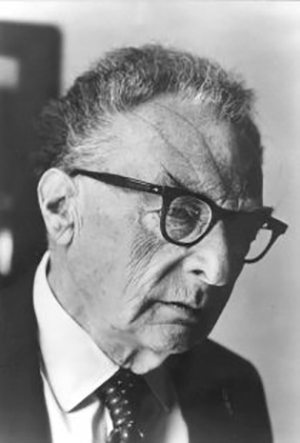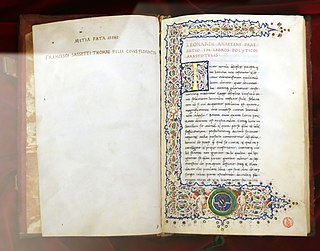In philosophy, deconstruction is a loosely-defined set of approaches to understanding the relationship between text and meaning. The concept of deconstruction was introduced by the philosopher Jacques Derrida, who described it as a turn away from Platonism's ideas of "true" forms and essences which are valued above appearances.

Ferdinand de Saussure was a Swiss linguist, semiotician and philosopher. His ideas laid a foundation for many significant developments in both linguistics and semiotics in the 20th century. He is widely considered one of the founders of 20th-century linguistics and one of two major founders of semiotics, or semiology, as Saussure called it.
Post-structuralism is a philosophical movement that questions the objectivity or stability of the various interpretive structures that are posited by structuralism and considers them to be constituted by broader systems of power. Although post-structuralists all present different critiques of structuralism, common themes among them include the rejection of the self-sufficiency of structuralism, as well as an interrogation of the binary oppositions that constitute its structures. Accordingly, post-structuralism discards the idea of interpreting media within pre-established, socially constructed structures.

Roman Osipovich Jakobson was a Russian and naturalised American linguist and literary theorist.

Structuralism is an intellectual current and methodological approach, primarily in the social sciences, that interprets elements of human culture by way of their relationship to a broader system. It works to uncover the structural patterns that underlie all the things that humans do, think, perceive, and feel.
Semiotic literary criticism, also called literary semiotics, is the approach to literary criticism informed by the theory of signs or semiotics. Semiotics, tied closely to the structuralism pioneered by Ferdinand de Saussure, was extremely influential in the development of literary theory out of the formalist approaches of the early twentieth century.

Literary theory is the systematic study of the nature of literature and of the methods for literary analysis. Since the 19th century, literary scholarship includes literary theory and considerations of intellectual history, moral philosophy, social philosophy, and interdisciplinary themes relevant to how people interpret meaning. In the humanities in modern academia, the latter style of literary scholarship is an offshoot of post-structuralism. Consequently, the word theory became an umbrella term for scholarly approaches to reading texts, some of which are informed by strands of semiotics, cultural studies, philosophy of language, and continental philosophy, often witnessed within Western canon along with some postmodernist theory.

A genre of arts criticism, literary criticism or literary studies is the study, evaluation, and interpretation of literature. Modern literary criticism is often influenced by literary theory, which is the philosophical analysis of literature's goals and methods. Although the two activities are closely related, literary critics are not always, and have not always been, theorists.
Stylistics, a branch of applied linguistics, is the study and interpretation of texts of all types, but particularly literary texts, and spoken language with regard to their linguistic and tonal style, where style is the particular variety of language used by different individuals in different situations and settings. For example, the vernacular, or everyday language, may be used among casual friends, whereas more formal language, with respect to grammar, pronunciation or accent, and lexicon or choice of words, is often used in a cover letter and résumé and while speaking during a job interview.
Narratology is the study of narrative and narrative structure and the ways that these affect human perception. The term is an anglicisation of French narratologie, coined by Tzvetan Todorov. Its theoretical lineage is traceable to Aristotle (Poetics) but modern narratology is agreed to have begun with the Russian formalists, particularly Vladimir Propp, and Mikhail Bakhtin's theories of heteroglossia, dialogism, and the chronotope first presented in The Dialogic Imagination (1975).
The Prague school or Prague linguistic circle is a language and literature society. It started in 1926 as a group of linguists, philologists and literary critics in Prague. Its proponents developed methods of structuralist literary analysis and a theory of the standard language and of language cultivation from 1928 to 1939. The linguistic circle was founded in the Café Derby in Prague, which is also where meetings took place during its first years.
Jonathan Culler is an American literary critic. He was Class of 1916 Professor of English and Comparative Literature at Cornell University. His published works are in the fields of structuralism, literary theory and literary criticism.
Peter Preston Brooks is an American literary theorist who is Sterling Professor Emeritus of Comparative Literature at Yale University and Andrew W. Mellon Scholar in the Department of Comparative Literature and the Center for Human Values at Princeton University. He has been Professor in the Department of English and School of Law at the University of Virginia. Among his many accomplishments is the founding of the Whitney Humanities Center at Yale University. He was elected to the American Philosophical Society in 2003. Brooks is an interdisciplinary scholar whose work cuts across French and English literature, law, and psychoanalysis. He was influenced by fellow Yale scholar, Paul de Man, to whom his book Reading for the Plot is dedicated. His 2022 book Seduced By Story was a finalist for the 2023 National Book Critics Circle award in criticism.

Poetics is the study or theory of poetry, specifically the study or theory of device, structure, form, type, and effect with regards to poetry, though usage of the term can also refer to literature broadly. Poetics is distinguished from hermeneutics by its focus on the synthesis of non-semantic elements in a text rather than its semantic interpretation. Most literary criticism combines poetics and hermeneutics in a single analysis; however, one or the other may predominate given the text and the aims of the one doing the reading.

The sociology of literature is a subfield of the sociology of culture. It studies the social production of literature and its social implications. A notable example is Pierre Bourdieu's 1992 Les Règles de L'Art: Genèse et Structure du Champ Littéraire, translated by Susan Emanuel as Rules of Art: Genesis and Structure of the Literary Field (1996).
Structural linguistics, or structuralism, in linguistics, denotes schools or theories in which language is conceived as a self-contained, self-regulating semiotic system whose elements are defined by their relationship to other elements within the system. It is derived from the work of Swiss linguist Ferdinand de Saussure and is part of the overall approach of structuralism. Saussure's Course in General Linguistics, published posthumously in 1916, stressed examining language as a dynamic system of interconnected units. Saussure is also known for introducing several basic dimensions of semiotic analysis that are still important today. Two of these are his key methods of syntagmatic and paradigmatic analysis, which define units syntactically and lexically, respectively, according to their contrast with the other units in the system. Other key features of structuralism are the focus on systematic phenomena, the primacy of an idealized form over actual speech data, the priority of linguistic form over meaning, the marginalization of written language, and the connection of linguistic structure to broader social, behavioral, or cognitive phenomena.
Vraisemblance is a principle developed in the theatrical literature of Classicism in France.
The Tartu–Moscow Semiotic School is a scientific school of thought in the field of semiotics that was formed in 1964 and led by Juri Lotman. Among the other members of this school were Boris Uspensky, Vyacheslav Ivanov, Vladimir Toporov, Mikhail Gasparov, Alexander Piatigorsky, Isaak I. Revzin, and others. As a result of their collective work, they established a theoretical framework around the semiotics of culture.
In literary theory, literariness is the organisation of language which through special linguistic and formal properties distinguishes literary texts from non-literary texts. The defining features of a literary work do not reside in extraliterary conditions such as history or sociocultural phenomena under which a literary text might have been created, but in the form of the language that is used. Thus, literariness is defined as being the feature that makes a given work a literary work. It distinguishes a literary work from ordinary texts by using certain artistic devices such as metre, rhyme, and other patterns of sound and repetition.






